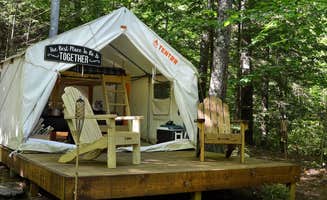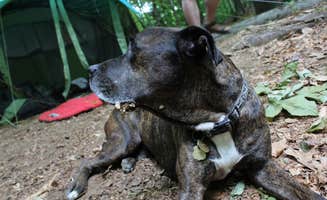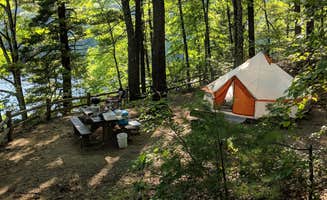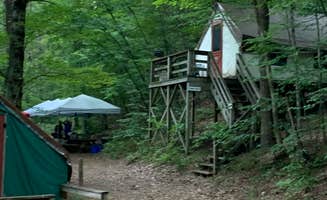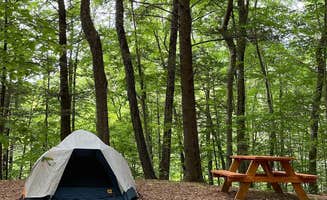Tent campsites near Jaffrey, New Hampshire offer campers access to the Monadnock Region, with Mount Monadnock rising to 3,165 feet elevation. Summer temperatures typically range from 55-80°F, while spring and fall can bring overnight temperatures below 40°F, requiring proper sleeping gear for comfort. Winter camping options remain limited due to seasonal closures at most area campgrounds.
What to do
Paddling adventures: Tully Lake Recreation Area provides kayak and canoe rentals for exploring the lake's islands and shoreline. The campground connects to water recreation opportunities with rental equipment available on-site. "We take our canoe and spend the whole day at the lake. You can find lots of private areas to swim, pick blueberries and relax," notes camper Ben P. from Tully Lake.
Waterfall hiking: Doane's Falls near Tully Lake offers an easy hiking trail suitable for families with children. The path ascends through woods alongside a series of five waterfalls with photography opportunities. "If you'd like to hike with children, there is an easy hike close to the entrance, along Doane's Falls, a series of 5 waterfalls along an ascending path through a wooded area," explains reviewer Nancy R.
Mountain climbing: For more advanced hikers, Mount Monadnock trails start directly from HQ Campground at Monadnock State Park. The mountain offers multiple trail options ranging from moderate 2-mile routes to challenging 4+ mile trails with significant elevation gain. Trail maps are available at the park office for day hikes.
What campers like
Lake access sites: At Tully Lake, waterfront sites provide direct lake access for swimming and paddling without needing to drive elsewhere. "Score a campsite at this Army Corps of Engineer owned/Trustees of the Reservation operated campground and you can either paddle or walk into your site," reports Jean C., noting that "you are able to swim from your campsites if you so desire."
Vehicle-free camping experience: Many campers appreciate the Barton Cove Campground setup which keeps cars away from actual campsites. "There was only 1 other occupied campsite so it was very quiet and private," mentions Brie B., though she notes the gate system creates "a bit of a hassle but worth it" for the quiet camping experience.
Private sites with natural boundaries: The layout of tent sites at many area campgrounds creates privacy between camping neighbors. "The campsites are spacious and though there is not a bad site, some are better suited for certain purposes like group camping," notes Miguel B. about Tully Lake's site arrangement, where trees and terrain create natural site separation.
Seasonal wildflowers: Jean C. mentions wildflowers blooming in July around Tully Lake's dam area, providing natural beauty and photography opportunities for campers during summer months.
What you should know
Reservation timing: Tully Lake's popularity means sites can fill up immediately when reservations open. "The sites fill up weeks out (and can completely fill the day registration opens, which is date-dependent each year)," warns Kris M. of Maple Ridge Farm. Make reservations months ahead, especially for holiday weekends.
Carry-in camping logistics: At Tully Lake, no vehicles are allowed at campsites, requiring use of provided wheelbarrows for gear transport. "They provide carts to truck your things in, anywhere from a few yards to about a mile," explains Kris M., recommending packing minimally or planning multiple trips from the parking area.
Limited facilities: Federated Womens Club State Forest offers primitive camping with composting toilets and no running water. "Bring your own water. There is a composting toilet located near the group site in the field," advises Jean C., also noting "cell phone coverage is faint to nonexistent on Verizon."
Bug preparation: Summer camping requires insect protection. "Buggy in June so bring your repellent," warns Sa R. about Tully Lake. Pack permethrin-treated clothing and EPA-approved repellents for maximum comfort during summer months.
Tips for camping with families
Consider site distance from facilities: When camping with children, bathroom proximity matters. At Lost Boys Hideout, the Sleepy Hollow site offers upgraded tent camping with mulched areas and games. Lauren A. notes her experience at another campground: "Our site was fairly far from services, long run with small kids in the middle of the night."
Car-free camping benefits: Megan G. appreciates how Tully Lake's no-vehicle policy creates safer spaces for families. "No cars at all at the campsites, which was great for peace of mind as our toddler roamed around. It also made for a super quiet stay."
Quiet time enforcement: Lauren A. notes that holiday weekends can bring different camping experiences: "We went memorial day weekend few years ago, busy holiday of young teens partying. Park staff tried their best, but other campers definitely took away from our stay." For family camping, consider weekdays or non-holiday times.
Amenity needs: Consider what amenities your family requires. "The camp's minimal store sells ice cream and a (very) few sundries, so come prepared," notes Miguel B. about Tully Lake, emphasizing the importance of bringing essential supplies for family camping.
Tips from RVers
Limited RV options: Most tent campsites near Jaffrey focus primarily on tent camping with few RV accommodations. For RV camping, look to commercial campgrounds outside the immediate Jaffrey area, as state parks and recreation areas primarily offer tent-only sites without hookups.
Walk-in site advantages: The walk-in setup at Federated Womens Club State Forest creates quiet camping atmospheres without generator noise or vehicle traffic. "It's possible to park at other sites; I'm guessing the gate at the beginning of the road toward the campground is open when the campground is open. If so, high clearance vehicle is definitely preferred," notes Jean C.
Road access considerations: Access roads to primitive campgrounds may challenge larger vehicles. "The entrance road is marked with signs, but I accidentally drove past it the first time," explains Jean C., recommending downloading offline maps before arrival due to limited cell service in many camping areas.


